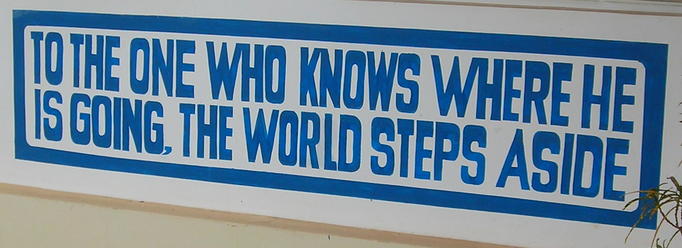Without Internet access, are computers any good for Sierra Leone?
(This is my summary of a story told me by Lucia Mazzoni. Paragraphs in bold and beginning with my name are my own comments, added later. The second part is here)
In February 2012, I spent 15 days in Sierra Leone, to meet the people helped by a project launched 10 years ago. After the Civil War the people in greatest trouble were those who had suffered amputations: the project helps a group of amputeed (hands, arms, feet, legs ...) hosted at the end of conflict in 2001, in a refugee camp in Aberdeen, a village near the capital Freetown (I also blogged about my trip here (italian).
I started carrying a new computer for our friend and local project representative: father Daniel, a Catholic priest native of Sierra Leone. I thought a lot about which operating system I should install on that laptop, but in the end I didn't dare to install Linux. Father Daniel is not very competent, he knows he learned on Windows. Besides...
The popularity of Windows, due to its factory installation on PCs, makes it a de facto "standard", which is even more binding in this country where the opportunities of access to different information are minimal. It is a knowledge problem, another gap adds to the those already present in that land and among those populations (I use the plural on purpose, to remember al the many different ethnicities and languages ??in a relatively small area).

(Marco: I was struck by the contradiction between this situation and slogans painted on walls in schools, like this one beside a photo by Lucia. Wise words, as long as a school does teach kids the right direction...)
Catholics are a minority in Sierra Leone (30%) and the priests are quite close to each other, so while I was there they learned that father Daniel had a visitor that could help them to fix their computers.
Computer-wise, even the other Italian missionaries I encountered are in a situation very similar to Father Daniel. I was frustrated by the diffusion of Windows laptops among them, a cost so unnecessary and unsustainable in the poverty they live in. This is due part to their education, (which I assume to be non-existent, when it comes to computers), and their rather high (60 / 65 yrs) average age.
(Marco: the cost of Windows is a small part of total cost, and unfortunately sometimes those who do try to offer laptops without Windows give up because today it can be an extra cost that consumers just ignore. The cost of Windows remains unacceptable, but for many other reasons, starting from lack of localized applications), and include what Lucia explains in the second part.
In general, however, the biggest barrier remains Internet access. Cellular network are everywhere in Africa, as far as I know, and today that is also true for Sierra Leone which scores at the bottom of the human development index of the United Nations (181 on 187 countries). I used GPRS keys, working but unbearably slow. Satellite connections work fine but, being very expensive compared to the average standard of living, are only available in special places.
Today, a PC without Internet is little more than an overfeatured typewriter or calculator, which could also fail quite easily. Besides, lack of Internet access makes it pointless to study computer science today... who could do really learn such stuff, in the age of cloud computing, without Internet access? What job market would employ people with that kind of "skills"?
(Marco: of course the question is still valid, if not even more important, in other fields, not just employment. Without Internet access it is more difficult to communicate and be active citizens, even if you have a good job)
The story of Lucia's Travel in Sierra Leone continues here.
Who writes this, why, and how to help
I am Marco Fioretti, tech writer and aspiring polymath doing human-digital research and popularization.
I do it because YOUR civil rights and the quality of YOUR life depend every year more on how software is used AROUND you.
To this end, I have already shared more than a million words on this blog, without any paywall or user tracking, and am sharing the next million through a newsletter, also without any paywall.
The more direct support I get, the more I can continue to inform for free parents, teachers, decision makers, and everybody else who should know more stuff like this. You can support me with paid subscriptions to my newsletter, donations via PayPal (mfioretti@nexaima.net) or LiberaPay, or in any of the other ways listed here.THANKS for your support!